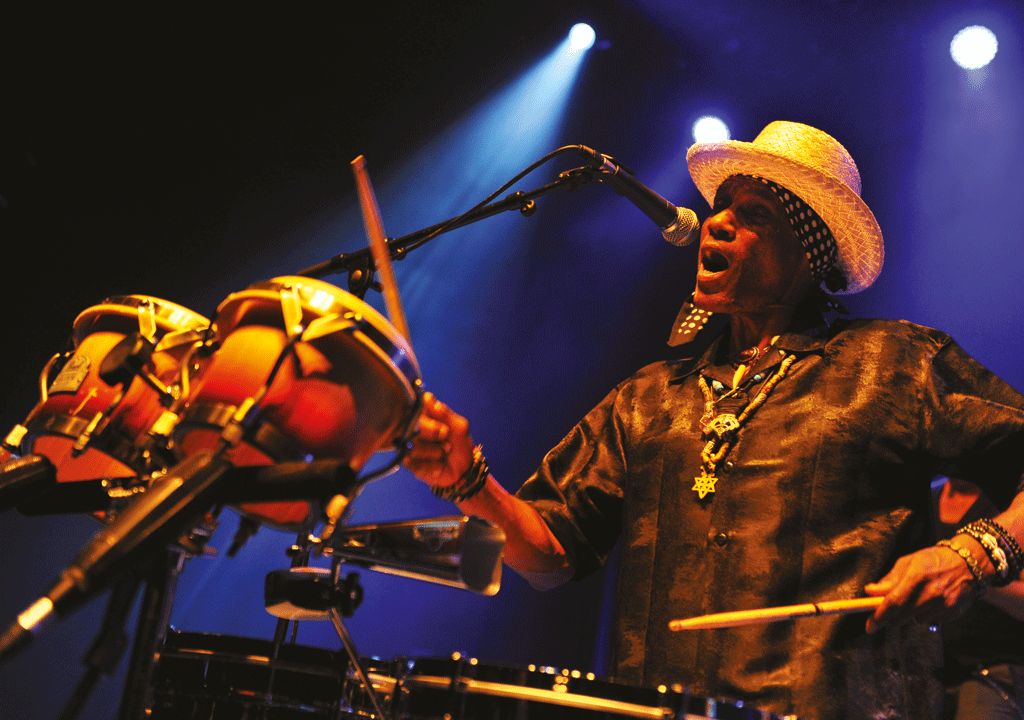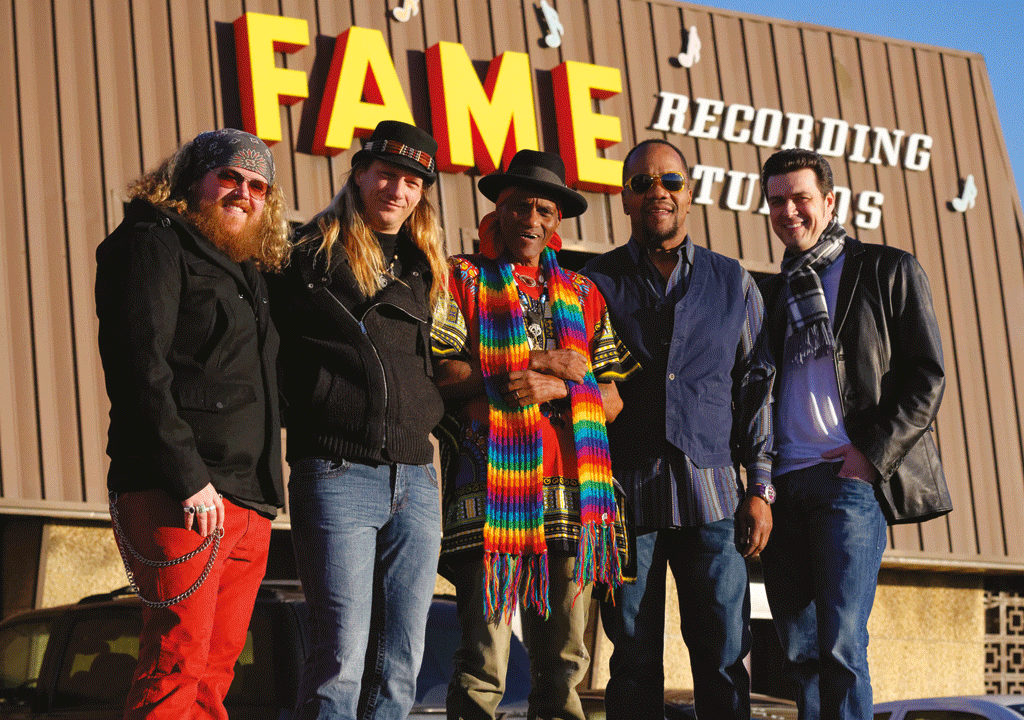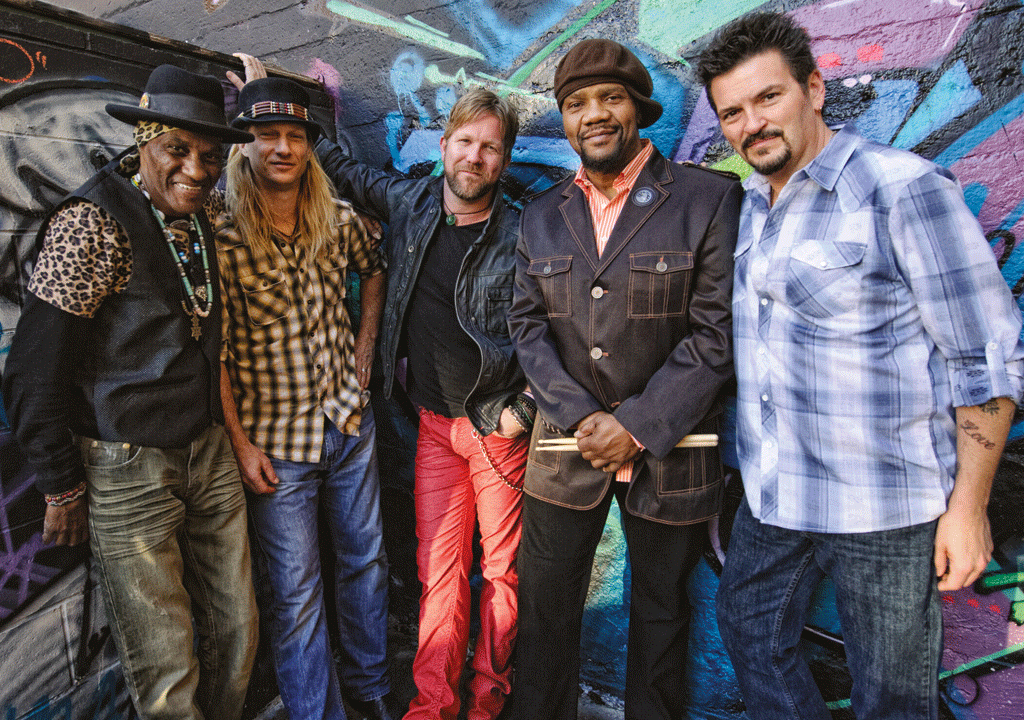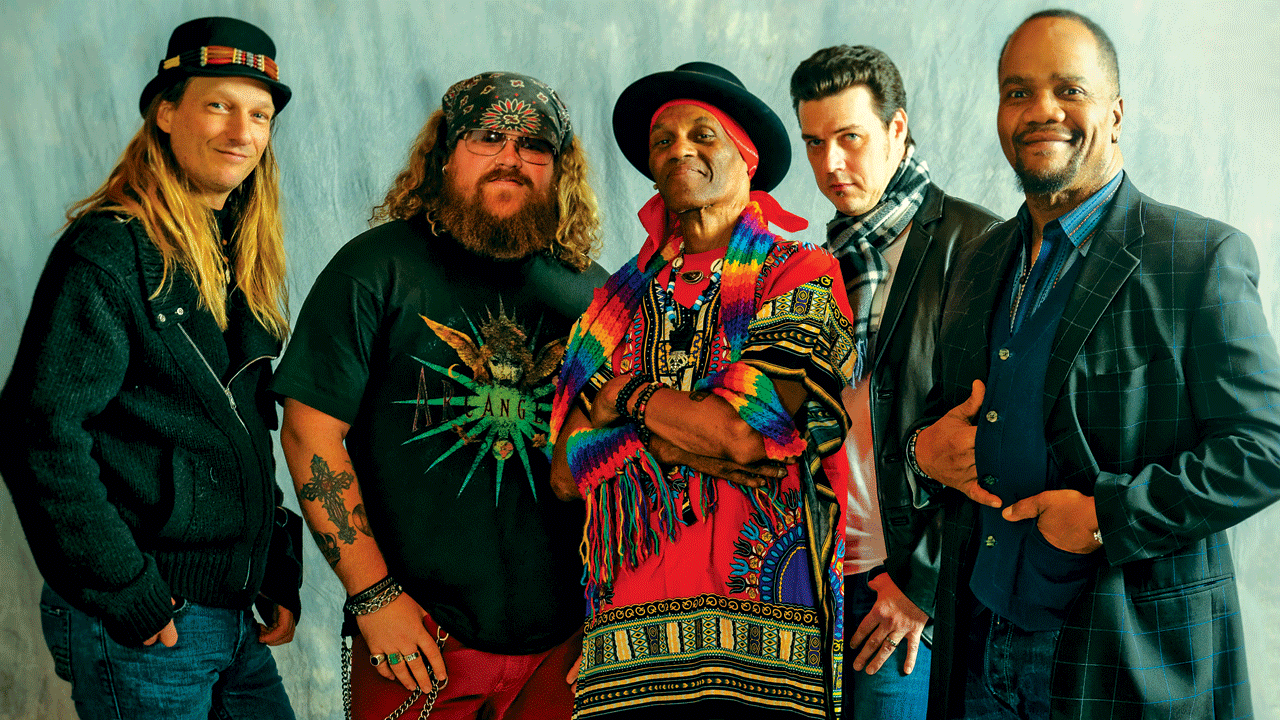At the time of their respective releases, Mike Zito’s Gone To Texas and Devon Allman’s Ragged & Dirty didn’t appear to be the writing on the wall. Those well-received solo projects by two key Royal Southern Brotherhood members – having hit the shelves roughly one year apart in 2013 and 2014 – seemed like standard operating procedure for a supergroup, where individual members have a reputation to uphold and are thus free to work on side projects as they see fit.
Yet as a fierce year of touring got underway following the release of Royal Southern Brotherhood’s own HeartSoulBlood, both Zito and Allman decided to call it a day. The parting was amicable and their reasons understandable: the Brotherhood’s brutal tour schedule left them with little time and energy to devote to their respective solo careers. Still, for a five-man band calling itself a brotherhood and the phrase “heartsoulblood” suggesting a deep spiritual connection that transcended mere business, the departure of these two vital contributors was jarring. It left a growing fanbase wondering about what had prompted the split./o:p
Looking back, the song Leaving from Ragged & Dirty (though written for him by producer Tom Hambridge) suggests Devon Allman knew for some time where things were headed. Since playing his last show with Royal Southern Brotherhood this spring, the busy St Louis resident has toured in support of his father Gregg Allman and has dozens of headline dates to carry him through the summer and autumn. As his last go-round with RSB wound down, his Facebook posts grew increasingly nostalgic. “Heart is very heavy. Been such an amazing run with men that truly became my brothers,” wrote Allman roughly a month before exiting.
When Mike Zito announced his intentions last year, the Texas-based singer and guitarist opened up about the creative conflict that had been eating away at him – and, presumably, Devon Allman as well./o:p
Royal Southern Brotherhood had formed in 2011, thanks in large part to New Orleans-based talent agent Rueben Williams, who was already managing Zito, Allman and singer/percussionist Cyril Neville at the time. The combo recorded its eponymous mix of ultra-funky blues, soul and rock in December of that year and exploded shortly thereafter. Though Zito was a willing founding member and someone who shared close musical bonds with Neville, he never expected the band to become a full-time occupation. Consequently, the feeling of neglecting his own songs – his “children,” as he calls them – became his constant companion as RSB commenced crisscrossing the globe. Eventually, he decided he needed to go home and take care of them. (See Behind The Wheel, below.)
“There is no animosity or any of that kind of stuff,” said Cyril Neville, reflecting on the split last December. “All of this is on the up and up and everybody is happy about it. We’re going to continue to write songs together and, who knows, maybe somewhere down the line there will be a reunion show. We stay in contact. We’re family.”/o:p

Above: Cyril Neville, the rhythmic heart of the RSB.
Exit Mike Zito, enter Bart Walker. The brawny, bearded, Nashville-based guitarist had two albums of bluesy southern rock under his belt and was planning a third when he got the call. “Me and my band were on a cruise gig,” Walker tells The Blues of being approached by Royal Southern Brotherhood in the winter of 2014. “There was a blues club on the boat, so we set up in there and played six nights a week over the wintertime in the Caribbean. As I was getting off that boat, I got an email asking if I would be interested in joining RSB. I was like, well, yeah! Just say when and where and let’s do it.”
Walker followed up that invitation by sitting in with the band at a gig a few months later. “It was when Walter Trout was going through all his liver stuff. There was a benefit for him in Nashville, and RSB asked me to come be a part of it. That was the first time Mike left the stage and I came on. We were trying to see if this would fit. From the first note, it was obvious. It was like, oh, this is gonna be brilliant.”
He immediately put the plans for his third album on hold, packed the songs he’d been working on into his lunch pail and set off for his new musical workplace. “Funny thing is, a lot of the songs I had been writing for my new record didn’t really sound like my band,” remarks Walker. One of those, the reggae and dub-tinged Don’t Look Back, would eventually emerge as the title track to Royal Southern Brotherhood’s newest disc, recorded at the storied Fame Studios in Muscle Shoals, Alabama this past January.
“Looking back on it now, it almost feels like God was leading the way to this,” Walker says of his new home alongside Neville, drummer Yonrico Scott, bass player Charlie Wooton and fellow newcomer Tyrone Vaughan. “Songs like Don’t Look Back and I Wanna Be Free, I’d already had going. I figured my band’s sound was changing. But as it turns out, those songs were [right] for this band. I still have over half a record written for my next record. But I don’t know when I wanna do it, because it’s the same as with Mike. I don’t want to be double dipping. There is not enough life for me to be doing that right now. I wanna get deep into this RSB before I do anything else.”
The circumstances surrounding Tyrone Vaughan’s entry into the fold could not have been more different.
The son of former Fabulous Thunderbirds guitarist Jimmie Vaughan (and nephew of Jimmie’s little brother Stevie Ray) had built a solid reputation in and around his hometown of Austin, Texas, and even dented the country music charts with his 2011 single Downtime. But his career derailed a couple of years ago due to health issues that would leave any professional guitarist shaking in his boots.
“I had chronic tendinitis in my elbows and had to take two years off from playing guitar,” explains the tall, sideburned Texan. “I overworked them using heavy gauge strings and my arms just burnt out. So I had to take a break. It was a very humbling experience. It really put things in perspective for me. I had to work hard to get out of that hole. To rehab and come back and slowly relearn how to play guitar. To play smarter and not harder.”
For a while, Vaughan doubted he would ever get back to being the player he was before. “When I heard old recordings of myself, I would think there is no way I’ll be able to play like that any more. I didn’t know what I was gonna do. But that was far from the truth. I’m coming back stronger and better. My arms are good and it’s just in time for Royal Southern Brotherhood.”
Viewed from a distance, the choice of Vaughan to take over for Devon Allman looks like a smart PR move. Like Allman, Vaughan’s name carries with it some big-time cache and gives him instant credibility in the blues world. But as Tyrone Vaughan tells it, the bond between his clan of royals, the Austin Vaughans, and Cyril Neville of the New Orleans Nevilles has a decades-long history.
“He used to come to Austin when my mom owned a pub called the Rolling Hills Soap Creek Saloon on the outskirts of Austin. He would come and play there back in the 70s,” he says of the man whose list of credits includes stints with The Meters and Neville Brothers. Cyril Neville later collaborated on the Stevie Ray Vaughan tribute Six Strings Down that appeared on Jimmie Vaughan’s 1994 recording Strange Pleasure. After being displaced along with thousands of other New Orleans residents following Hurricane Katrina, Neville put down stakes in Austin for a while. So the ties that bind are many. Indeed, since joining Royal Southern Brotherhood, Vaughan has not been shy about calling Neville Uncle and answering to name of Nephew.
“I’m a huge fan of Cyril,” he says. “To this day, for me, he is one of the most dynamic performers on the planet.”/o:p

When it came time for Vaughan’s unofficial RSB audition, the man with the neatly combed hair and cowboy boots was a stranger to all but Neville. “He called and told me to come out to Houston, where they were playing a show at a place called the Dosey Doe.” Without consulting the other four original members, Neville invited Vaughan to sit in. “I don’t know if anybody knew what was going on,” he continues. “Cyril told them that a friend of his named Tyrone was gonna come sit in. They thought it was some old black man!”
The overwhelming success of that Houston gig meant that the current five-piece line-up – Royal Southern Brotherhood Mark Two, if you will – was set. Mike Zito bowed out aboard the Legendary Rhythm & Blues Cruise last October, passing the torch to Bart Walker. Tyrone Vaughan would have to wait until the following April to begin touring with the band, but he instantly became involved in planning for the quintet’s third studio release. It would not be business as usual.
Rather than return to the Dockside Studios in rural Louisiana, where they had collaborated with veteran producer Jim Gaines on each of their first two recordings, Royal Southern Brotherhood moved east to Muscle Shoals, Alabama and the immortal Fame Studios that helped birth the Muscle Shoals sound of soul giants like Percy Sledge, Wilson Pickett and The Staple Singers. They brought in Tom Hambridge to produce and had top-drawer talent like keyboardist Ivan Neville and horn players Jimmy Hall, Max Abrams and Paul Armstrong punch up the sound.
With all of that change and activity swirling about them, there was never any pressure on Vaughan or Walker to replicate the work of predecessors Allman and Zito; Neville and the others were simply looking for solid musicians ready to commit to the cause.
“[They wanted] high energy, positive, good vibes,” says Tyrone Vaughan. “A good working attitude. Being able to handle things and handle yourself. The kind of things you expect out of anybody and everybody.”
Though his name turns up just twice in the songwriting credits (on the aforementioned I Wanna Be Free and again on Poor Boy, where he handles lead vocals), Vaughan’s presence is felt through guitar playing that is lean and jagged, much like his father’s. Because Bart Walker’s fretwork is comparatively fluid and flashy, the two new kids on the block provide a riveting one-two punch, as can be heard on the guitar-duel codas that close several of the 14 cuts on Don’t Look Back.
“Bart and I seem to fall into place without trying,” smiles Vaughan. “It’s always great when that happens naturally. You want it to be natural. You don’t wanna force anything.”
Since his role became defined far earlier in the game, Walker had the opportunity to make significant contributions on the songwriting end. The remaining members of the band were more than open to his input./o:p
“Cyril and I hooked up and started exchanging song ideas,” he recalls of the first stages of the collaboration. “He was in Europe at the time, so we were at opposite ends of the clock. I would send him stuff, he’d wake up, listen, think about it and send back his ideas. We passed it back and forth.”
Romantic visions of five southern gents gathered with their instruments under a moss-hung oak on the banks of the Mississippi do not apply; musicians as busy as these men are compelled to use modern methods of communication and exchange.
“We would use GarageBand at our houses and lay down ideas. I would lay a corny bassline down and a drum track, then delete the bassline when I sent it to Charlie, so he could put down a real bassline with it. He’d add his bassline, then send it to Cyril and Cyril would sing over it. I’d put it all together on my unit at home and then send it out for everyone to listen to. That’s how we made our demos.”
The revamped line-up then gathered in New Orleans to flesh out the song ideas before moving on to Muscle Shoals. “It’s an unbelievably democratic group,” says Walker. “Everybody has a say. Everybody has an opinion. Everybody is willing to listen to the others’ opinions and flesh it out. This is something you don’t normally find in a band. Everybody is willing to listen to everybody and learn and go forward as a group.”
Don’t Look Back truly draws on input from the entire crew – and then some. Cyril Neville, who has emerged as the de facto frontman, turns up 11 times in the songwriting credits. Bart Walker co-wrote six of the tunes, Charlie Wooton four, Tyrone Vaughan and Yonrico Scott two apiece./o:p
Others like Tom Hambridge, Ivan Neville, Anders Osborne and Devon Allman also made contributions. Not surprisingly – more so than ever, really – there are all kinds of aromas and flavours bubbling inside this musical melting pot.
That richness is one of the elements that attracted Tyrone Vaughan to Royal Southern Brotherhood – a quality he wasn’t fully aware of until sitting in with the band in Houston. “I was excited. The music was so diverse, from A to Z, the whole spectrum. They were covering a lot of ground, and I like that. It seemed bigger than small time, small town. The new record has everything from Bayou rhythms to African rhythms to straight, in-your- face blues. There’s also some real soul songs, like old throwback R&B. The real deal.”
Bart Walker likes the band’s ability to adapt and change things around on the fly, as they did on the sinewy southern rock number I Wanna Be Free, where he, Neville and Vaughan each sing a verse. “Originally, I had the music and two verses. Cyril wrote a third. Then, when Tyrone joined the band, we threw away my second verse and Tyrone wrote a verse.” Egos, he points out, were never in play. He’s comfortable with Cyril Neville handling the vast majority of the lead vocals on the album because it’s something that simply happened. “We never thought about it. We were making a record for the good of the music.”
“Everybody cares and everybody wants the best music possible. That’s what it’s all about,” adds Tyrone Vaughan.
The past year has forced Royal Southern Brotherhood to reinvent themselves. They’ve done so without missing a beat. As the title Don’t Look Back suggests, all eyes are set on the future. Walker and Vaughan – the new blood in the Brotherhood – are fully committed. That in itself counts for a lot.
“What we’re creating now… the stuff we created on this record and the vibe that’s coming out, the brotherhood that’s really forming,” says Walker, “is something I really want to sink into.”
Vaughan still has a bit of rust to shake off, but has put his extended layoff in the rear-view mirror and is ready to take on the world. “This is the path that I took years ago. My dad did the same thing. My uncle did the same thing. I know I’m supposed to be playing. I feel this is what I’m supposed to do.”/o:p
Don’t Look Back is out now via Ruf Records./o:p
Behind The Wheel
Mike Zito on why he had to say goodbye to his bandmates.
When Mike Zito talks about his three years as a member of Royal Southern Brotherhood, he uses words like “crazy” and “bittersweet” and calls the whole experience a whirlwind. Discussions about forming the project first became serious in the summer of 2011 — a time when Zito had just released the most personal album of his career, Greyhound.
“I had a new sound and direction and I was hellbent on getting out there and doing my thing,” he tells The Blues. “At the same time, RSB was being born. I had issues with leaving my music behind to form a new band, but I knew it was the right thing to do and that I needed to get my head in the game. So I walked away from Greyhound and jumped headfirst into Royal Southern Brotherhood. I was excited about the new ground we were breaking and working with great musicians like Charlie Wooton and Yonrico Scott, but sad to say goodbye to an album I hold dear to my heart.”
For as long as he was bound by the band’s record contract, Zito decided to give Royal Southern Brotherhood all he had both musically and spiritually. “But in my heart I knew that I needed to get back to my music and my dream at some point in the future.” That day arrived following the recording of HeartSoulBlood early in 2014. “I knew that was my last effort with the group — at least for the time being. I had too much music in me. Too many songs I was writing. I wanted to sing all night again!”
So Zito shifted gears and is now once again free to devote himself to his own band, The Wheel. The quartet will record their next album this summer, tentatively titled Keep Coming Back. “My focus now is writing the best songs I can write and getting back in the studio to record the new album. The Wheel is a special band and I am excited about the future of our music together.”
His take on the new RSB line-up? “With Bart and Tyrone on guitars, the Brotherhood is in good hands. They’re killer. I heard the new album and it made me smile.”/o:p

